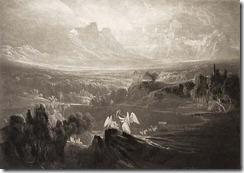On this Great Books Monday, I’ve been ruminating on the difficulty of some of the works we’re going through. Seriously, Aristotle’s Physics and Kant’s Critique of Pure Reason are pretty dense. I’ve had to remind myself that part of analytical reading is developing the willingness to slow down and go over a passage multiple times if necessary to get its meaning. It’s frustrating when one has a busy schedule, but worth it in the long run. Hang in there!
Here are the readings for the coming week:
- Paradise Lost by John Milton, Book XI (GBWW Vol. 29, pp. 299-318)
- The Physics of Aristotle, Book III (GBWW Vol. 7, pp. 278-286)
- “The Concurrent Majority” by John C. Calhoun (GBWW Vol. 7, pp. 276-290; excerpts from A Disquisition on Government)
- The School for Scandal by Richard Sheridan, Act IV (GGBVol. 4, pp. 125-141)
- “Scientific Study of the So-Called Psychical Processes in the Higher Animals” by Ivan Petrovich Pavlov (GGB Vol. 8, pp. 294-309; Chapter IV of Lectures on Conditioned Reflexes)
- The Critique of Pure Reason by Immanuel Kant, “Transcendental Logic,” Introduction and Analytic Book I (GBWW Vol. 39, pp. 34-59; begins on p. 64 of the linked PDF)
After reading so many speeches and letters from Abraham Lincoln earlier in this program, it’s nice to see a selection from Calhoun, one of the greatest political thinkers this country has produced.
Here are some observations from last week’s readings:
 Paradise Lost by John Milton, Book X:I like how Satan gets an unwelcome surprise when he returns to hell and is greeted by hissing. There’s also what I think are nice emphases on God’s mercy and Adam and Eve’s presumed penitence. What would two people in such a situation talk about? What would they do?
Paradise Lost by John Milton, Book X:I like how Satan gets an unwelcome surprise when he returns to hell and is greeted by hissing. There’s also what I think are nice emphases on God’s mercy and Adam and Eve’s presumed penitence. What would two people in such a situation talk about? What would they do?- The Physics of Aristotle, Book II: Believe it or not, I enjoyed the discussion of causation, especially the enumeration of the many senses of the term which we often overlook today. I’ve already made one post on this section, so I’ll move on for now.
- “English Men and Ideas” by Voltaire:It felt like science overload this week; not only is the Aristotle work concerned with physics, but these excerpts also focus primarily on English scientists and their accomplishments. Voltaire couldn’t sing Newton’s praises highly enough. What I can’t stand about Voltaire is his perpetual construction of straw men when describing thinkers with whose views he disagrees. He’s worse than Paul Krugman in this regard, if you can believe it.
- The School for Scandal by Richard Sheridan, Act III:There’s some brilliant dialogue in this act. I laughed out loud at the part where the rich uncle poses as a potential moneylender to the spendthrift brother and gets treated to all kinds of crazy stories about himself. (“His own relatives wouldn’t recognize him.” Indeed!) I’m looking forward to seeing how this turns out.
- “Definition of Number” by Bertrand Russell:After getting past the by-now-familiar and gratuitous swipes against everyone in the history of mathematics and philosophy, I enjoyed this essay. I wasn’t really happy with the definition he ended up with because despite Russell’s protestations it still smacked of circularity to me. But I thought he did a good job of avoiding the use of numeric symbols to define the concept of number.
- The Critique of Pure Reason by Immanuel Kant, “Transcendental Aesthetic”: I wish I knew more of the history of modern philosophy so I’d have a sense of whether the conception of space and time as a priori intuitions is still in vogue. I had never thought about this idea before and don’t fully know what to make of it.
Although it heated up into the mid-80s here last week, we’re supposed to settle down into highs in the 70s in the next day or two. I’m not certain, but I think that Kant may make more sense when read outdoors. I’m going to test my hypothesis this week.

The scene of Satan’s return with all the rebellious angels turned into serpents who could only hiss is the perfect Dantean illustration of the punishment fitting the crime. Who said Milton did not have a sense of humor? Didn’t you laugh and cheer? And the penitence initiated by Eve is the perfect comeback to the feminists. Milton gives Eve a lot more character than they do.